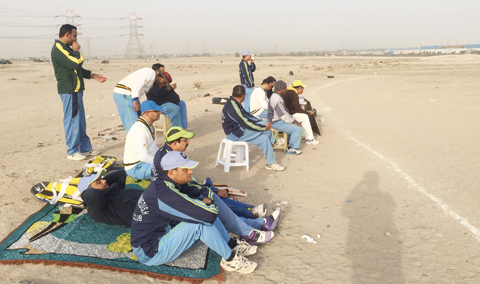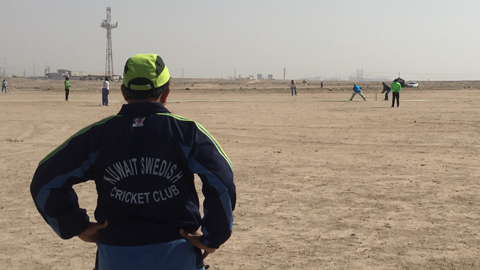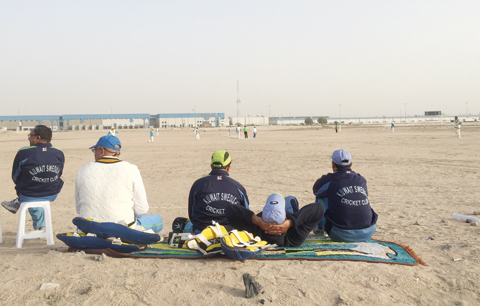 The team is made up of Indian and Pakistani expats, who share a strong bond.—Photos by Finn McHugh
The team is made up of Indian and Pakistani expats, who share a strong bond.—Photos by Finn McHughKUWAIT: Despite its name, the Kuwait Swedish Cricket Club is not made up of eleven sunscreen-covered Svens and Bjorns, protecting their fair skin from the Gulf sun. Swedes don't play cricket.
The team's captain, Ali Busheri, laughs at the thought as he speeds through traffic. The club's unique name comes from its sponsor, the Kuwait Swedish Cleaning Services Company, he explains.
In fact, the situation could hardly be less Scandinavian: A team of Indian and Pakistani expats playing a Commonwealth sport in the Arab desert.
Ali, an Indian who has lived in Kuwait his whole life, has played for the Swedes for the past 18 years. "Most [of the players] come up to the veterans' leagues when age hits and we can't keep up with the younger ones," he explains. "Some of the guys have been playing together for fifteen years. We might be getting older, but we've stuck together as a team."
Next to him, Neville D'Souza nods in agreement. As the warm-up begins, he is rugged-up in a beanie to protect himself from the desert chill. He is hardly unique in this respect; the rest of the team is wearing jackets and jumpers, shivering as they wait for a practice catch. The hard ball might be stinging their palms, but this is nothing; last week was much colder, Neville says. They are used to braving harsh conditions, Ali remembering games in the summer which began at around 4am, the only way to avoid temperatures which climb into the mid-50s.
Today is a big match, the semi-final. Their opponents, Shaheen, beat them in the regular season but there is an air of confidence that a good performance will see them through to the final. The championship match will be played in Doha on a turf pitch and grass outfield, quite the contrast to today's setting: a hard, arid desert broken only by a concrete pitch.
 An outfielder for the Kuwait Swedish Cricket Club watches from the boundary.
An outfielder for the Kuwait Swedish Cricket Club watches from the boundary.RIVALRY
There's something oddly fitting about a team named after a third country hoping to bridge a political divide. Their kit bears the Pakistani and Indian crest on its sleeves, the rivalry between the two countries non-existent in the Kuwaiti desert. Instead, it's a brotherly bond than transcends anything else. "That's the beauty of playing here," says Munawar, a right-arm spinner. "India and Pakistan have always had diplomatic problems, but here we're all together."
Zahir Mahmood, from Pakistan, agrees. "Ali's my brother," he says. "We've been playing together for fifteen years ... It's never a problem with the people, it's all created by the politicians."
This unity is never more evident than during the lunch-break, the team huddled together against the freezing wind, most clutching a cup of sweet tea. A bag of parathas - a flatbread found in both countries - is passed around alongside a tin of mint yogurt and a semolina cake. The teams are generous, chatting happily in Urdu before switching to English. "Please, you're our guest. Eat more."
Having finished their meal, the Swedes go out to defend 166 in 20 overs, a total Neville and Ali agree is slightly too small on this wicket. Quite what distinguishes this wicket from the six nearby, each outfield hard as rock with a coat of dust, is unclear.
As his teammates walk out, Zahir takes a seat in the front of his Toyota. For him, the weekend game is a ritual in a country that does not provide "much entertainment for the expats." He has been playing cricket since 1982, and despite not being required for the semi-final, came down to enjoy the company of his teammates wearing his full kit. "I knew I wasn't playing today, Ali told me. My body may not be made for cricket anymore," he laughs, patting his belly. "But it's a chance to get out, see my friends and joke around."
"Cricket is in my blood," he adds simply.
If anyone can make that claim, it's Zahir. His brother, Azhar, played 21 Tests for Pakistan and is now a bowling coach for the national team. Zahir would love to open a cricket academy in Australia, but works in Kuwait to provide for his parents. He has seen the growth of the sport in Kuwait over the years, but concedes "only outsiders play here." You might be able to find pick-up games in every nook and cranny across Kuwait City, there might be 250 clubs here, but it's still a sport for expats. The locals prefer soccer, with European leagues televised across the country.
 Members of the Kuwait Swedish Cricket Club watch their teammates during the first innings.
Members of the Kuwait Swedish Cricket Club watch their teammates during the first innings.DANGERMAN
Zahir is erudite and expansive, conversation drifting at will between Pakistani politics, the Kashmir conflict, the correct technique for a cover-drive, the difficulties of child rearing, a blow-by-blow-account of Pakistan's World Cup semi-final victory in 1993, and back to politics. He knows what he is talking about, adding a gentle touch on the knee for emphasis, but rarely takes his eyes off the on-field proceedings as he speaks.
Neville strikes in the first over, Shaheen's opener - a dangerman, apparently - out to a loose shot. "They're not playing cricket. I am 100% sure we will win this match," Zahir says in his succinct, assured way. It's a claim he tempers with every boundary his opponents strike, but reiterates with total conviction at the fall of each wicket.
On the field, Neville continues to rip through Shaheen's top-order, but once he's out of the attack, the batsmen steady the ship and score with ease. In the warmth of the car, Zahir's cricket brain is simmering away, cooking up another tactical plot. "Ali, brother," he says, winding the window down as his captain jogs past to retrieve the ball. "Time for a spinner."
He nods approvingly as his plan bears fruit next over. "See? With the fast bowlers they use the pace, but now they're -"
The sentence ends abruptly as he slams his car-horn, adding a flourish to the team's on-field appeal. "Out! Out!" he yells, his head of out the window. Zahir may not be playing, but he'll do whatever he can to get his teammates over the line.
They need it, too. The game comes down, implausibly, to the final ball. Shaheen have a wicket in hand and need two runs to win. One run would tie the match, sending it to a super-over. Clipping the ball through the leg-side, the batsmen are comfortably through for the first but, in the confusion over a second, both end up at the bowler's end. It's the simplest of chances, but somehow an errant throw allows them to scamper through for the win.
For the Swedish Cricket Club, it's a bitter end; Shaheen has won by the narrowest possible margin. Amidst the normal teammate bickering that follows such a tight loss, Ali is the calm head. "Mistakes are part of the game," he tells his dejected teammates. "You win some, you lose some." In the car home, he soothes the still-despondent Neville. "It was their destiny to win today."
By Finn McHugh









